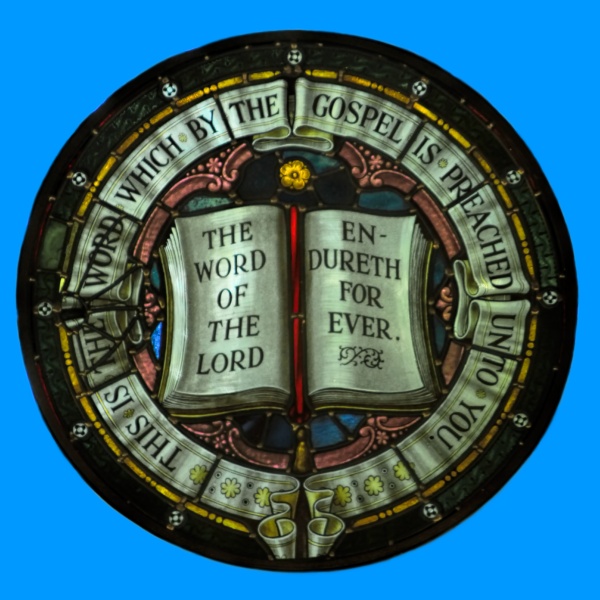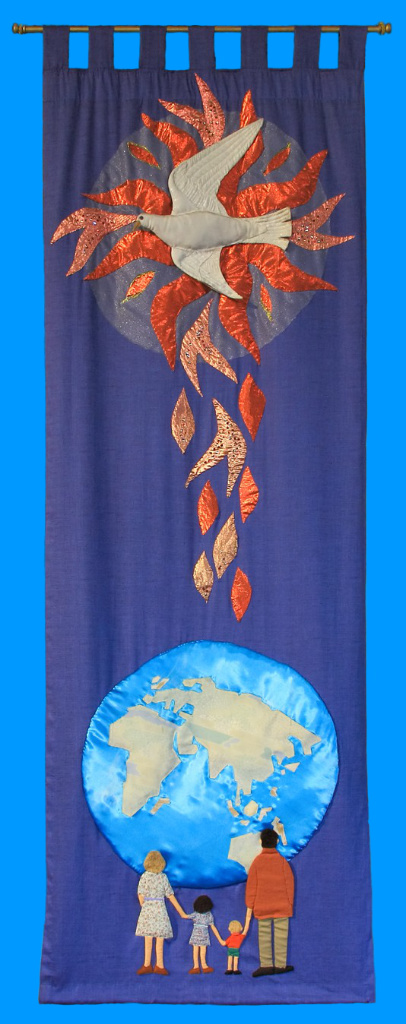Owing to the COVID-19 outbreak, we are not able to meet at Headingley St Columba until further notice. For this Sunday, we have recorded a slimmed-down version of Morning Worship.
You can listen to the service here:
or download it by RIGHT-clicking here: Headingley St Columba podcast 29 March 2020
Here is the order of service, with Clare’s text (which you can also download by clicking here):
Online Morning Worship – Sunday 29 March 2020
Organ Prelude: Air and Gavotte – Samuel Wesley (1766 – 1837)
Lent Liturgy – 5th Sunday, crown of thorns
As we follow our Lord through the events of His Passion, we remember today how the soldiers mocked Him, calling Him King of the Jews, and we have the symbol of the crown of thorns
O dearest Lord, thy sacred head
with thorns was pierced for me;
now pour thy blessing on my head,
that I may think for thee.
H. E. Hardy (1869-1946)
A prayer of approach
Lord God almighty, I come before you, to worship you, to praise you for who you are and all that you mean to me. I am aware of my need of you in every part of my being. As I draw near, as I am held by you, as your words of life flow through me, I slowly look into the face of the One who holds me… I see your beauty. I confess the ugliness in myself, and ask it will be replaced by your beauty. I open myself to you now, and all you have to show me this day. For I come and I pray in the precious name of Jesus, our Lord and Saviour, Amen.
Ezekiel 37.1-14
To give a bit of the background, Ezekiel was a priest and a prophet, born c. 620 BC and brought up in Jerusalem under Assyrian, then Babylonian rule. He was eventually taken into exile to Babylon in his 20’s. The book reflects his prophesy of judgment on Israel & Jerusalem, then on the surrounding nations. In chapter 33, the tone changes to a mixture of warnings to repent, judgments, and visions of restoration. The vision in chapter 37 begins with a picture of death and despair, of a state of hopelessness.
The King of love my Shepherd is
The King of love my Shepherd is,
Whose goodness faileth never;
I nothing lack if I am his
And he is mine for ever.
Where streams of living water flow
My ransomed soul he leadeth,
And where the verdant pastures grow
With food celestial feedeth.
Perverse and foolish oft I strayed,
But yet in love he sought me,
And on his shoulder gently laid,
And home, rejoicing, brought me.
In death’s dark vale I fear no ill
With thee, dear Lord, beside me;
Thy rod and staff my comfort still,
Thy cross before to guide me.
Thou spread’st a table in my sight;
Thy unction, grace bestoweth:
And O what transport of delight
From thy pure chalice floweth!
And so through all the length of days
Thy goodness faileth never;
Good Shepherd, may I sing thy praise
Within thy house for ever.
H W Baker (1821-77)
John 11.17-45
This reading is the story of when Jesus raised Lazarus from the dead. Preceding it, Jesus is on the other side of the river Jordan with His disciples, in the region of Perea, staying in safety from those who would harm Him in Jerusalem. When Jesus hears of Lazarus’ illness, He lingers a couple more days, then sets His face to go to Jerusalem, despite opposition from the disciples.
Ezekiel 37.1-14 & John 11.17-45 – Hope in ‘I AM’
Our readings have given us the prophet Ezekiel, with his vision of a valley of dry bones, and the raising of Lazarus, a foretaste of Christ’s own resurrection. Both readings are about hope, and hope in the face of despair; both are about resurrection, bringing to new life; both are about showing who our God is; and at another level, both are about His love for His people. Those things may give us hope in our lives, in what we’re facing at the moment, and in the run up to Easter.
In Ezekiel’s day, the Jewish people in exile felt hopeless; they even felt abandoned by God, especially after the Temple and Jerusalem were destroyed.
In Bethany just before Jesus’ triumphant entry into Jerusalem, Jesus and His disciples arrive to a scene of mourning and despair. Lazarus had been in the tomb 4 days and as you can imagine, he was starting to stink! But seriously, the sisters were beside themselves with grief. Both of them greeted Jesus with the words, “Lord, if you had been here, my brother would not have died.”
Remember Mary was the one who’d sat at Jesus’ feet. And yet here, in the face of grief, maybe she feels He has let her down. Jesus Himself wept, maybe not for Lazarus’ death itself, but for the distress the sisters were in.
Most of us, I’m sure, at some time or another, have been in a difficult place. In our current situation with the coronavirus, we may be tempted to ask, “Where are you God?” We can imagine that many are living in fear, not knowing where to turn. We may never have felt abandoned by God, but all of us will have had times of grief or felt overwhelmed by life’s happenings. In some of those, we may have wondered where God is, or have said to Jesus, “if only you’d been there!”
In these passages, in the midst of hopelessness, we get a sense of God is, that God is there, that God will act, that God is all powerful.
In Ezekiel, God says to the dry bones, “I will cause breath to enter you, and you shall live. I will lay sinews on you, and will cause flesh to come upon you… and you shall know that I am the Lord.” His words are a picture of the house of Israel – spiritually dried up, and without hope, feeling cut off from God. God says that He will bring them out of their graves, and back to the land of Israel. He goes on to say that He will put His spirit within them, and they will live. “…then”, He says, “you shall know that I, the Lord, have spoken and will act.”
Those words are God’s assurance to the people. He will act, He has promised, and by those actions the people, “my people” God says, will know that He is Lord. He hasn’t deserted them. He is there after all.
Jesus is also talking about God being there. He says to the disciples back in Perea, “This illness does not lead to death; rather it is for God’s glory, so that the Son of man may be glorified through it.” Of course, they didn’t understand at this stage, and the conversation reads a bit confused. In exasperation, Jesus tries to tell them plainly, “Lazarus is dead. For your sake I am glad I was not there, so that you may believe” – but I’m still not sure they realised what He was saying until after Lazarus was raised.
In Bethany, Jesus speaks words of reassurance to Martha. He then prays out loud before calling Lazarus out of the tomb. He prays that this is taking place so that those there would believe that God had sent Him – that’s Martha and Mary, all their friends, people from Jerusalem, the disciples, the crowd.
This is about believing Jesus is from God, has the power of God, that God is among them. It’s so that the disciples might believe, and others might see who Jesus really is, the Messiah, the light of the world. We hear in the last vs of that reading, ‘Many of the Jews therefore, who had come with Mary and had seen what Jesus did, believed in Him.’ God is revealed there on earth.
In all our times of despair, even in this present time of isolation, and all that means, God is there for us too. Sometimes we can feel spiritually dry, doubts can crowd our minds, life happenings can take over. But God is always there for us. Even when we can’t perceive Him, God never leaves us, because God is God.
And in all of that, in the prophesy of Ezekiel and the raising of Lazarus, we get a sense of hope. God hasn’t abandoned His people Israel. He is faithful and steadfast in love for them. In that image of resurrection in Ezekiel, we see hope: dry bones coming together, growing sinews and flesh, and life being breathed into them, bringing them to new life. It’s the future hope that God will restore His people. It’s not just that the people will be restored to the land, but also that the people will be restored to God – His covenant people.
In Jn’s gospel, Jesus speaks words of hope in the conversation with Martha, telling her that Lazarus will rise again. This sparks future hope for Martha in the resurrection on the last day, but of course Jesus means He will raise Lazarus now. And He gently leads the conversation to show her that He is the resurrection and the life.
And that’s the point of this miracle: of Jesus delaying His journey to Bethany, of Lazarus dying, of raising him again. It’s to show that Jesus is the resurrection and the life. It’s to bring hope to the disciples too, as they face the end of the following week when Jesus is taken and crucified. He is showing them, not that they quite got it at the time, that the one who has the power to raise Lazarus, will rise again on the 3rd day, as He had already told them.
This miracle is a foretaste of Easter Sunday. It’s a picture of new life for us because of Christ’s resurrection. It’s a sign of the restoration of the whole of humanity to God, through Jesus – the hope of new life for all.
This is hope for us too, not just for the future, but for the here and now in our own lives. Former Bishop of Durham, Tom Wright, said that the hope of the Bible isn’t about a hope that something might happen, but it is about what we have been promised by God, that will happen. The promise of new life starts for us here, as the Spirit breathes into our lives, and it’s the promise of resurrection life to come.
In those times of our despairing, we can look up in hope. We can know that God is with us. As we look to the resurrection, we can find hope in all our situations. The crown of thorns, the cross, is the story of love – God’s love for us in Jesus, to restore us to new life in Him, and to give us hope. The cross can look as much a place of despair as the valley of dry bones or the tomb of Lazarus. It is where Jesus cried out, “My God, my God, why have you forsaken me?” And yet in that cross, in that love poured out, is the hope of humanity.
Amen.
Prayers for others
We say the Lord’s Prayer together
A final prayer
Blessing
May the blessing of God almighty, Father, Son and Holy Spirit, be with us all and those we love, now and always, Amen.
Organ Voluntary: Choral Song – Samuel Sebastian Wesley (1810 – 1876)


